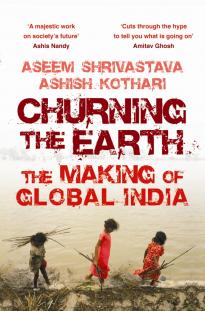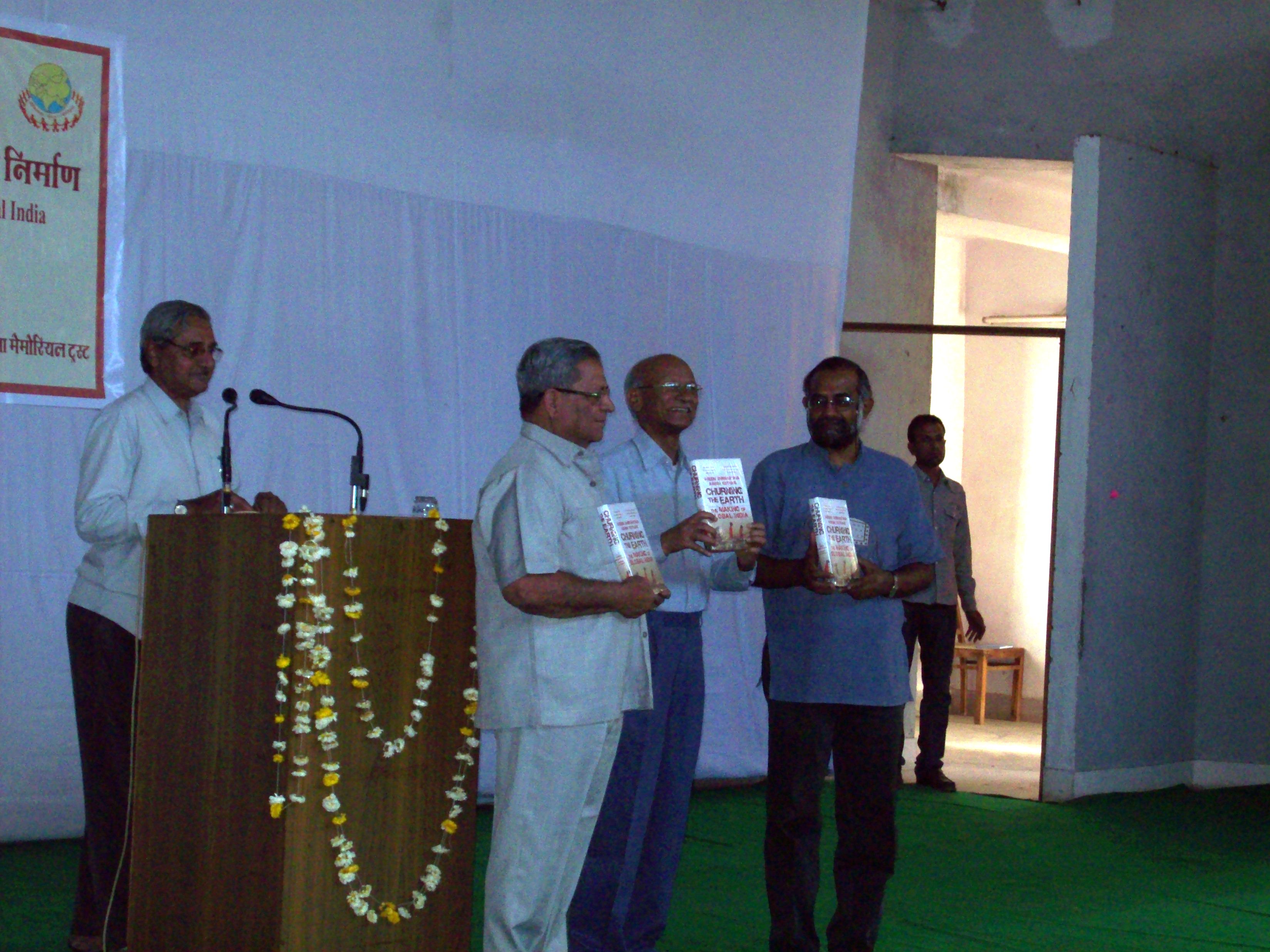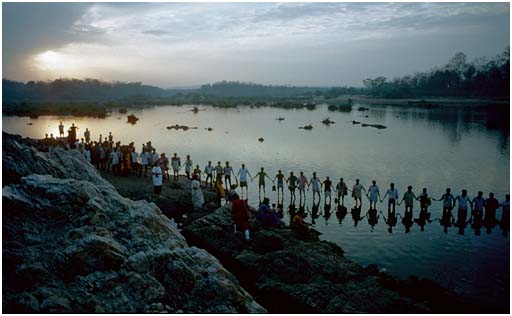At a book release event organised jointly by Dr Mohan Singh Mehta Memorial Trust (MSMMT) and Society for Promotion of Wastelands Development (SPWD), Udaipur on 23 March 2013 at Vidhya Bhawan Auditorium, Udaipur, Ashish Kothari, founder of the environmental group Kalpavriksh spoke on his recent work ”Churning the earth: The making of global India”. Co-authored with Aseem Shrivastava and launched in May 2012, the book presents evidence on the predatory nature of India’s economic rise and questions its political and ecological sustainability.
The book urges a “fundamental shift towards a range of policy, grassroots and conceptual alternatives that are necessary to forestall the descent into sociological chaos”. Amitav Ghosh in an advance praise of the book notes that it “cuts through the hype to tell you what is going on… the only work I know of that provides a comprehensive account of the enormous social and environmental costs of the developments of the last fifteen years… substantiated with a great deal of data”.

Kothari began his talk by noting that India’s vision of ‘development’ is founded on violence against nature, people, and cultures. Kothari gave an account of some of the trends of what has happened to India’s environment in the last couple of decades. Fifty per cent of the forest has disappeared in the last 200 years, seventy per cent of water bodies are polluted or drained out, forty per cent mangroves have been destroyed and nearly ten per cent of wildlife is threatened with extinction. Also, India is now home to some of the world’s most polluted cities and coasts.
Since 1991, which marked the beginning of economic reforms, there has been a single minded pursuit of economic growth through trade (export-import) liberalization, Foreign Direct Investment, delicensing, single window clearances and privatization.
Kothari said that ‘liberalisation’ has relaxed standards and procedures for industry. There have been thirty dilutions in the Environmental Protection Act and notifications (Coastal Regulation, Environmental Impact Assessment), at the behest of industry, and agencies like World Bank. Development is coming at the cost of weakening of environmental regulation and globalisation has increased environmental destruction.
Giving an account of ecological destruction, he said that India has a huge ecological deficit mirroring the world trend at present. It has the world’s third largest ecological footprint and is using twice what can be sustained by our natural resources. There is a decline in the capacity of nature to sustain us, by almost half as per statistics from Global Ecological Footprint and CII, 2008.

Book Release event at Udaipur
It is clear that our path of development is leading us to ecological unsustainability, he said. Speaking about India’s ‘development refugees’ he noted that the figures for people who have been physically displaced are estimated at around 60 millions in the last fifty years. As per the Planning Commission forty per cent of the displaced are adivasis and the resettlement efforts have been abysmal. The impacts on us as human beings is very clear in terms of the loss of livelihood of people who directly depend on natural ecosystems – fishing communities, farming communities, adivasis etc. There has been a displacement of traditional livelihoods (e.g. handlooms). Small and marginal farmers have got pauperized; there have been 200,000 suicides (many in Punjab!).
The growing inequality is leaving half our population behind. He said that growing employment was a myth and actually what we have is ‘jobless growth’ in organised sector. The figures for unemployment have remained static at 26.7 million in 1991 to 27 million in 2006!. Furthermore, there are huge wealth inequities with the top 10 per cent owning 53 per cent of the wealth while the bottom 10 per cent own just 0.2 per cent. Kothari noted that the figures for per cent population below the poverty line in the c0untry ranges from 38 to 55 per cent. India has the world’s largest number of malnourished and undernourished women/children.
Land acquisition is leading to a lot of disputes in the country. At the same time Kothari noted that India has joined China and Japan to be the new coloniser. Karaturi Global has acquired about 360,000 ha. in Ethiopia for floriculture, sugarcane, palm oil, etc while Eurovistaa has taken over 10,000 ha. in Tanzania for cotton and 55,200 ha in Indonesia for palm oil. More such acquisitions are coming up in Latin America and Africa all with the direct and indirect support by government.

Escaping India’s globalization trap; Image courtesy: Ashish Kothari
Discussing India’s path of ‘globalised development’ which is a fundamentally wrong model Kothari stated that Gandhi had once said that “if India is to take Britain’s path of ‘development’, it will strip the world bare like locusts”. Kothari discussed the concept of radical ecological democracy, an alternative framework of human well being spelt out in the book.
He drew the attention of the house to the several instances where communities, civil society groups and government groups are working on sustainable initiatives without causing the kind of ecological damage, inequalities and displacement that the current model of development does. These examples are actually exploding across the country but they are still not a critical mass to provide answers to the kind of globalised development that is taking place.
In particular, he drew the instance of Mendha-Lekha (Maharashtra) where the community was working towards tribal self-rule, with conservation. All decisions were taken in gram sabha (village assembly) and activities are taken up even by government officials with sabha consent. Informed decisions are taken through monitoring and regular study circles (abhyas gat). Conservation of 1800 ha forests is being done this way, now with full rights under Forest Rights Act.
Kothari provided an account of Community Forest Rights (FRA) under which several hundred claims have been accepted in states such as Maharashtra (>7 lakh acres), Odisha (>1.5 lakh acres) & Andhra (>1 lakh acres). There has been an assertion of CFRs against industrial projects (e.g. POSCO), mining (e.g. Vedanta), logging (e.g. Baigachak, MP) and plantations (Odisha). He gave examples of livelihood security through community-led cooperatives, self-help groups, producer companies: Dharani, Andhra Pradesh; Kachchh Mahila Vikas Sanghatan / Kasab, Gujarat; Nowgong APCL, Madhya Pradesh; Nyoli, Uttarakhand; Swach, Pune; Aharam Traditional Crop Producer Co.,Tamil Nadu). The instance of Jharcraft in Jharkhand based on reviving crafts was given which had provided employment for 2.5 lakh families and thereby reduced outmigration.
He provided an account of small-scale community initiatives such as by Deccan Development Society (DDS) where in the low-rainfall region of Zaheerabad, Andhra Pradesh, dalit women’s sanghas (assemblies) have worked on promoting sustainable agriculture.
Kothari discussed the concept of Radical Ecological Democracy, an alternative framework of human well being. He talked of achieving environmentally sustainable human welfare, through governance mechanisms that: empower all citizens to participate in decision-making, ensure equitable distribution of wealth and respects the limits of the earth and the rights of nature.
This he said would entail a new politics of decentralised decision-making: ‘localisation’ and embedded landscape institutions. He spoke of the need for ecoregional planning across states/provinces and countries and the need to align political boundaries with ecological and cultural ones. State accountability through citizens’ charters, public hearings, social audits, right to participation, policies was also discussed.
Radical Ecological Democracy would also entail a new economics according to Kothari. It would be mindful of ecological limits (sustainability): freshwater, climate, biochemical cycles. It would have equity as a core principle and outcome. The indicators of human well-being would be food/water/energy security, dignified livelihoods, happiness/satisfaction, social relations, health and learning. It would also facilitate local currencies and non-monetised exchanges.
This would also bring forth a new culture of knowledge, and knowledge of culture. It would be a mix of tradition and modernity after critically examining both. It would provide opportunities for spiritual and ethical growth without falling into the trap of bigoted religions. The fundamental values & principles of Radical Ecological Democracy were set forth by him. These included biophysical sustainability, equity (inter/intra-generational, inter-species) and decision-making access to all. There is a need to respect the basic principles of pluralism and diversity (of ideas, knowledge, ecologies, economies, polities, culture) etc, he said.
There is need to build government institutions that are truly bottom up and ensure democratic governance that starts from the smallest, most local unit such as panchayats and urban local bodies. It is necessary to build these grassroot institutions and combine and link them across larger landscapes which are in many cases ecologically defined. Larger level institutions, at global, national and state levels are also needed.
He said that a global flow of ideas, cultures, materials will continue, but on principles of Radical Ecological Democracy. There would be no imposition of one model across the world.
The scenarios for 2060 were spelt out by Kothari. The first was that of business as usual with widespread ecological collapse, worse social inequities, water/resource wars, xenophobia and fortress mentality. The second comprised of managerial responses through technological/market fixes and better laws/policies. Through this collapse is slowed down, not averted as inequities persist. The third scenario is of Radical Ecological Democracy. Under this full-scale collapse is averted, seeds are sown for dramatic paradigm shifts, and bioregionalism & localisation gain over nationalism. He concluded by saying that India is uniquely positioned to evolve alternative models like RED.
Kothari’s talk was followed by an address by Kishore Saint. He dealt with the enormous footprint of India’s development on the environment and social fabric and applauded the authors for producing a eye-opening critique of India’ growth story. Other than the citizen’s reports by CSE on the state of India’s environment this is the only work that provides a comprehensive account replete with a lot of data on the enormous social and environmental costs of the developments of the decade and a half, Saint noted.
/articles/churning-earth-making-global-india-ashish-kothari-talks-about-his-recent-work-book-release